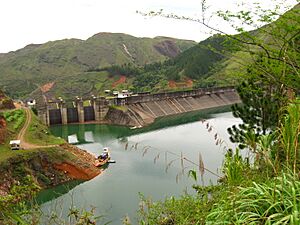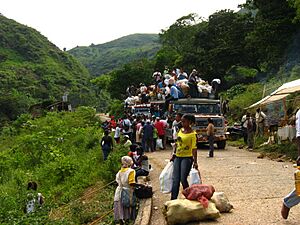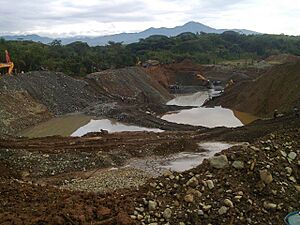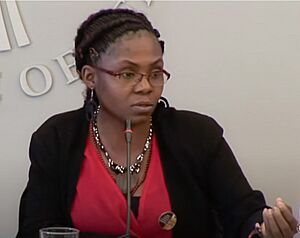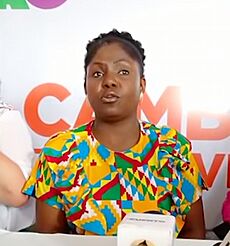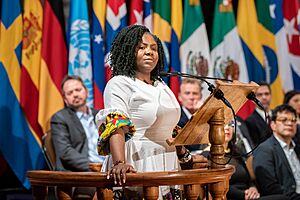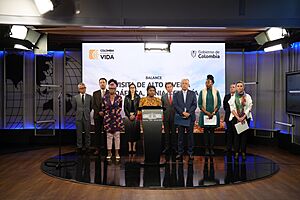Francia Márquez facts for kids
Quick facts for kids
Francia Márquez
|
|
|---|---|
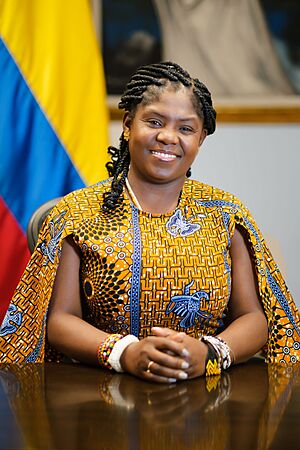
Official portrait, 2023
|
|
| 13th Vice President of Colombia | |
| Assumed office 7 August 2022 |
|
| President | Gustavo Petro |
| Preceded by | Marta Lucía Ramírez |
| Minister of Equality and Equity | |
| In office 1 June 2023 – 27 February 2025 |
|
| President | Gustavo Petro |
| Preceded by | Office established |
| Succeeded by | Carlos Rosero |
| Personal details | |
| Born |
Francia Elena Márquez Mina
1 December 1981 Yolombó, Suárez, Cauca, Colombia |
| Political party | Soy Porque Somos (2021–present) |
| Other political affiliations |
Alternative Democratic Pole (2021–2023) Historic Pact for Colombia (2021–present) |
| Domestic partner | Yerney Pinillo (since 2020) |
| Children | 2 |
| Education | National Learning Service |
| Alma mater |
|
| Profession | Lawyer |
Francia Elena Márquez Mina (born 1 December 1981) is a Colombian human rights and environmental activist, lawyer, and politician. She has been the 13th and current Vice President of Colombia since 2022.
Francia Márquez was born in Yolombó, a village in the Suárez area of Cauca Department. She started working as an activist at age 13. This was when a dam project threatened her community. When she became Vice President, she was the first Afro-Colombian person to hold this important job in Colombia's history. She is also the second woman to be Vice President.
In 2020, Márquez announced she would run for president in the 2022 Colombian presidential election. She later became the running mate for Gustavo Petro. In 2023, she was also named Minister for Equality and Equity.
In 2018, she won the Goldman Environmental Prize. This award was for her work to stop illegal gold mining in her community. She also organized a protest march of 80 women. They walked 560 kilometers (350 miles) to the capital city of Bogotá. They demanded that all illegal miners leave their community. In 2019, the BBC included Francia Márquez on their 100 Women list.
Contents
Early life and activism
Francia Elena Márquez Mina was born on 1 December 1981. Her hometown is Yolombó, which is part of the Suárez area in Cauca.
Protecting the Ovejas River
When she was 13, in 1994, Márquez began to fight against mining. She also worked to protect the Ovejas River. This river was a very important water source for her community.
Some companies wanted to move the river towards a large dam. But her community worked together and stopped this project.
Other companies wanted to dig for gold in the area. They tried to get the community to agree by building roads and giving school supplies. Márquez remembered that some people liked this help. But others were suspicious. They thought, "nothing comes for free." They worried about a mining project. So, they listened to their elders and said "no" to the company.
Fighting illegal mining
Around 2009, more international mining companies came to Colombia. They wanted to take out natural resources.
Márquez helped lead protests against the government's plans. These plans would have forced Afro-Colombians and small-scale miners off their land. The government had given companies the right to mine for gold without asking the local people. Márquez and her community filed a lawsuit to challenge this. During this time, some people in her group received threats. Sadly, some miners were killed by armed groups. But Márquez won when the court sided with her community.
In 2013, Márquez became a legal helper for her community. She also worked to protect their land.
The next year, illegal miners caused environmental damage. They drilled holes near the Ovejas river. The river became poisoned because of mercury used in mining. Márquez took legal action again. She worked with others to stop the damage. However, in October 2014, Márquez had to leave her home with her children. This was because she received threats from armed groups.
Political journey
The march to Bogotá
Because of the growing threats from illegal mining, Márquez organized a long march in 2014. It was 350 kilometers (217 miles) from Cauca to Bogotá. Eighty Afro-Colombian women took part in this march. It brought a lot of attention to illegal mining in Cauca. It also showed the harm it caused to people and the environment. The group arrived in Bogotá ten days later. They started protesting, demanding an end to illegal mining.
After protesting for 22 days, Márquez and other community leaders reached an agreement. The Colombian government agreed to act against illegal mining. They set up a special team in 2015 to deal with the problem. This was the first time in Colombian history. The security forces then began to remove illegal mining equipment. By the end of 2016, all illegal mining tools were gone from La Toma. Márquez's hard work and success were praised around the world. Her efforts also inspired other communities to fight illegal mining. Because of her work, Márquez received the Goldman Environmental Prize in 2018.
Working for peace
In December 2014, Márquez went to Havana, Cuba. She took part in peace talks between the government and a rebel group. Márquez explained how the conflict had hurt Afro-Colombians the most, especially black women. She stressed that minority groups needed to be part of the peace talks. This was important to make sure peace would last.
In June 2020, Márquez was chosen for the National Peace and Co-existence council. This council was set up to check if the peace agreement was being followed. She was the council's president in 2021.
Running for Vice President in 2022
Francia Márquez announced she would run for president in April 2021. She spoke at the National Feminist Convention. Other groups and candidates supported her campaign. She spoke up for women, Afro-Colombians, and indigenous communities. These groups had often been left out of Colombian politics.
In December 2021, a political party supported Márquez's campaign. This happened after she could not collect enough signatures to run as an independent candidate.
In the March 2022 primary elections, Márquez got a lot of votes. She received 783,160 votes. This placed her second, after Gustavo Petro. She had the second-highest number of votes among all primary candidates.
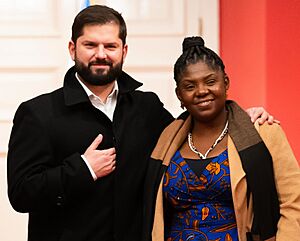
On 23 March 2022, she agreed to be the Vice President candidate with Gustavo Petro. Márquez promised that if they won, she would move the Vice President's office. It would move from Bogotá to Medellín. Petro said that if they won, Márquez would work to improve equality for different ethnic groups. She would also help regions that felt left out. Petro also promised to create a new Ministry of Equality, which Márquez would lead.
During the campaign, Márquez and Gustavo Petro received many threats. In one case, someone aimed laser beams at Márquez from a building. Her security guards quickly protected her. This looked like an attempt to harm her. Because of these threats, many officials and important people from over 20 countries signed a letter. They showed their concern about the violence against Márquez and Petro. The letter also mentioned that many social leaders had been killed in 2022.
On election day, 29 May, Márquez and Petro's team came in first. They moved on to the second round of voting. This was because no candidate got more than 50% of the votes. Márquez and Petro then faced another pair of candidates. Márquez and Petro won the second round on 19 June. After her victory, Márquez said that their government would not take away anyone's property. She also said that the biggest challenge she faced during the campaign was racist attacks. Márquez became Vice President on 7 August 2022.
Minister of Equality and Equity (2023-2025)
In July 2023, Márquez became the Minister of Equality and Equity. This ministry had been announced during the 2022 presidential campaign. On 8 May 2024, the court decided that the law creating this ministry would be removed. This meant the ministry would disappear in 2026.
On 28 February 2025, she left her position as Minister of Equity and Equality. Márquez mentioned that there was a lack of clear direction. She also spoke about some problems within the government.
Vice Presidency (2022–present)
Márquez officially became Vice President on 7 August 2022. She was also planned to lead the Ministry for Women and Equality.
In January 2023, Márquez spoke to the UN Security Council. She promised to hold a meeting of the United Nations Security Council in Colombia. She said their main goal was to keep all Colombians safe. They also wanted to protect those who defend human rights.
She survived another attempt to harm her in January 2023. Her security team found an explosive device on the road to her home.
Márquez faced criticism as an activist and defender of Afro rights. People also criticized her living conditions as Vice President. She was also the target of racist attacks.

In February 2023, she was criticized for where she lived. She chose to live in a private home instead of the official Vice Presidential house. She also received strong criticism for using a helicopter for travel. A few days later, Márquez explained that the president had suggested she use a helicopter. This was because he was very worried about her safety and her family's safety. She had reported several attacks that she had luckily escaped.
In May 2023, Márquez announced her trip to Africa as Vice President. She wanted to build stronger connections between Colombia and the African continent. She visited South Africa, Kenya, and Ethiopia. On 13 May 2023, Márquez met with the President and Deputy President of South Africa. She invited them to help with peace talks in Colombia. South Africa later agreed to this. She also talked about making it easier for people to travel between Colombia and South Africa. Later, on 17 May 2023, she met with the Deputy Prime Minister of Ethiopia. He was happy that Colombia was reopening its embassy in Ethiopia after fifty years. On 18 May, she met with President Sahle-Work Zewde. The President greeted her warmly, saying, "Welcome to your roots."
On Monday, 28 August 2023, Márquez welcomed the Canadian Minister of International Development. He confirmed Canada's support for projects that promote gender equality.
On Tuesday, 29 August 2023, she spoke for the first time as Minister of Equality. She attended a discussion in Congress. She talked about the government's plans and money for social programs. She defended a program called "Youth in Peace." This program helps to break up criminal groups in the country.
On Monday, 4 September, Márquez traveled to Kenya again. She went to take part in the African Climate Summit. On 6–7 September 2023, Márquez visited Ghana. She aimed to make relations stronger between Ghana and Colombia. Márquez said this was the first time leaders from Ghana and Colombia had met in 30 years.
Later, on Monday, 11 September, Márquez met with the Deputy President of Kenya. He later attended a meeting about coffee producers.
On Tuesday, 3 October 2023, Márquez traveled to Popayán, Cauca. She led an event where the government listened to people. However, many supporters booed her. They said the government was not being consistent.
On Wednesday, 29 November 2023, Márquez met with the Duchess of Edinburgh. They met at a center for women who had been victims of conflict. They talked about the women's experiences and needs.
On 14 December 2023, Márquez met with Pope Francis for 40 minutes. She later shared on social media that Pope Francis sent a message of love, joy, and hope to Colombia. He also asked them to keep working for peace, fairness, and dignity for all Colombians.
On Tuesday, 19 February 2024, Márquez met with the Mayor of Cali and the governor of Valle del Cauca. They talked about making shelters stronger for women who are in danger. The Vice President shared her concern about recent events in the area. She also gave information about cities that had reported killings of women in Valle del Cauca.
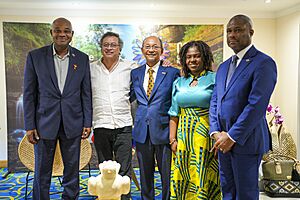
On Wednesday, 1 May 2024, Márquez joined marches for pension reform. This was part of the International Workers' Day celebrations. She gave a speech where she talked about the people. She also mentioned a former vice president who said that indigenous people were paid to join the marches. Márquez replied, "To Mr. former Vice President Francisco Santos, the indigenous people are not rented."
In August 2024, Márquez welcomed the Duke and Duchess of Sussex. She had invited the Duchess to visit.
Policies and views
Foreign affairs
In February 2023, she made her first official visit to Cuba. This visit showed the government's commitment to peace and respect for people's choices. Márquez said, "Returning to Cuba as Vice President... after having come a few years ago as a member of the victims' group in the peace talks... shows that in Colombia we are making our wish for complete peace come true. Of course, Cuba's role in that journey has been very important."
After becoming Vice President, Márquez focused on making the relationship between Colombia and Africa stronger. She called Africa the "cradle of humanity." In May 2023, she went on a tour to South Africa, Kenya, and Ethiopia. This was part of her "Africa Strategy 2022-2026." She met with important leaders in these countries.
Personal life
Márquez's father was a miner, and her mother was a farmer. Márquez said her childhood was spent "at my maternal grandparents' house, another time with my mother, and the rest with my paternal grandparents."
Márquez is an agricultural technician. She graduated from the National Learning Service. Later, in 2020, she earned a law degree from the Santiago de Cali University. In 2023, she received an honorary doctorate in education from the National Pedagogical University of Colombia.
See also
 In Spanish: Francia Márquez para niños
In Spanish: Francia Márquez para niños
 | May Edward Chinn |
 | Rebecca Cole |
 | Alexa Canady |
 | Dorothy Lavinia Brown |


